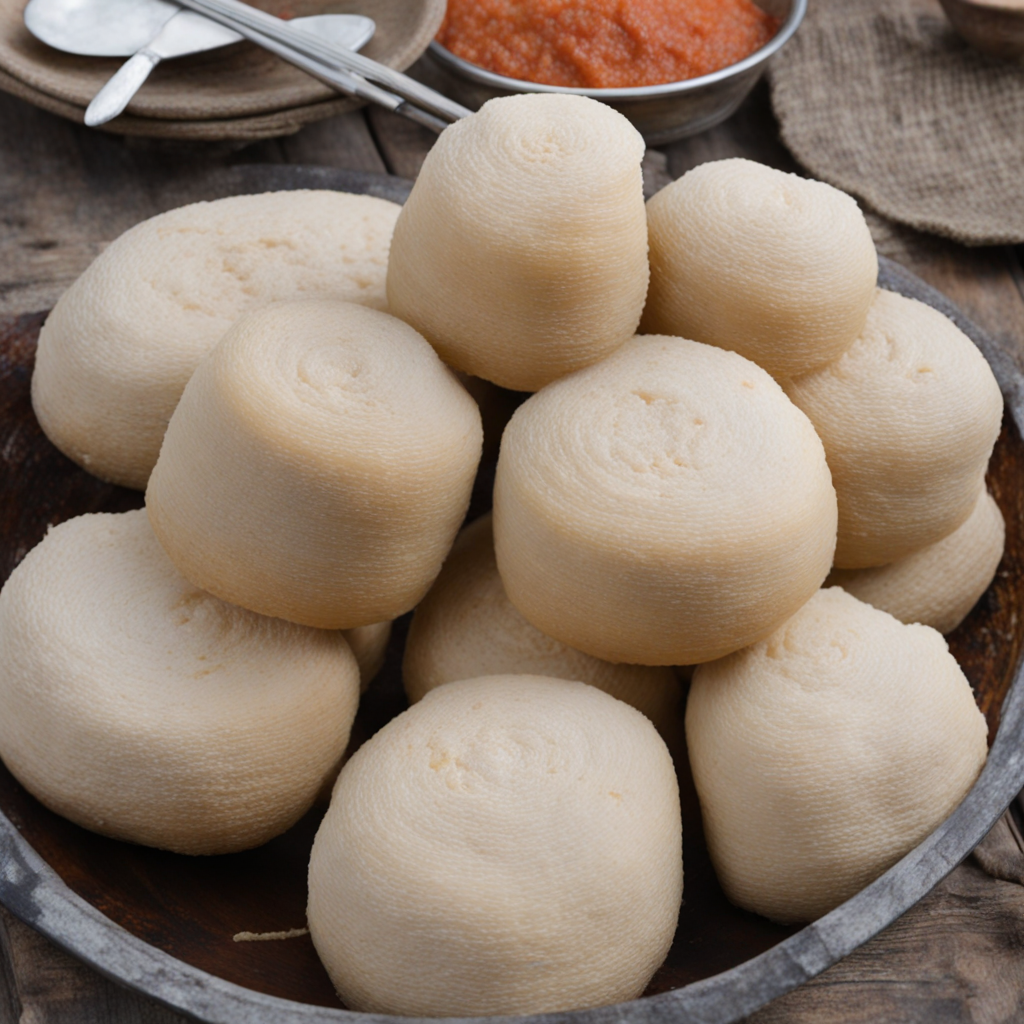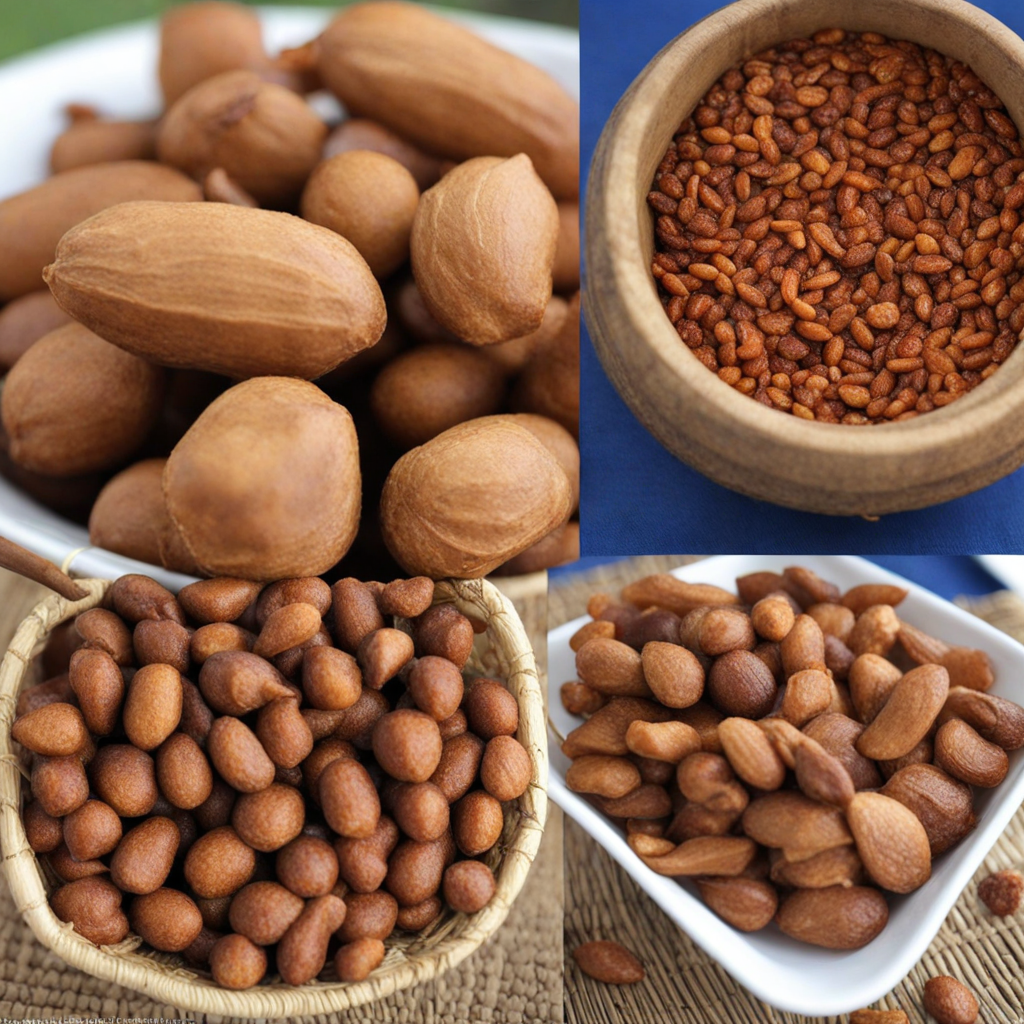Lafun
Lafun is a traditional staple food from Benin, made primarily from fermented cassava. The process begins with peeling and soaking the cassava roots, which are then fermented for several days. This fermentation not only enhances the flavor, giving Lafun its distinct tangy profile, but also helps in breaking down toxins present in raw cassava, making it safe for consumption. Once fermented, the cassava is dried and ground into a fine flour, resulting in a product that is both versatile and nutritious.
Lafun has a unique texture that is slightly grainy yet smooth, making it a delightful addition to various dishes. It can be prepared as a porridge or used as a thickening agent for soups and stews. The flavor is mildly sour, complementing a variety of ingredients, from spicy sauces to hearty vegetable dishes. When paired with protein-rich foods like fish or meat, Lafun creates a satisfying meal that reflects the essence of Beninese cuisine.
How It Became This Dish
The History of Lafun: A Culinary Legacy of Benin #### Introduction Lafun, a traditional food from Benin, is a staple that embodies the rich cultural heritage of the country. Made primarily from fermented cassava, Lafun is not just a source of sustenance; it is a symbol of identity, community, and resilience. This engaging history explores its origins, cultural significance, and evolution over time. #### Origins The roots of Lafun can be traced back to the indigenous peoples of West Africa, where cassava, a tuber native to South America, was introduced in the 16th century through the transatlantic trade routes. Its adaptability to various climatic conditions made it a favored crop, especially in regions like Benin, where the soil and climate favored its growth. In Benin, the people quickly learned to harness the nutritional potential of cassava, and Lafun emerged as a key food product through a traditional process of fermentation. The technique of fermenting cassava into Lafun not only enhances its nutritional value but also gives it a distinctive flavor and texture, setting it apart from other cassava products such as garri or fufu. #### Cultural Significance Lafun holds a significant place in the culinary landscape of Benin, often featuring in both everyday meals and special occasions. Its preparation is a communal effort, reflecting the deep-rooted traditions of cooperation and sharing within communities. Families often gather to peel, wash, and ferment cassava, turning the process into a social event that strengthens familial and communal bonds. In many Beninese households, Lafun is not merely food; it is a cultural artifact that tells the story of resilience and survival. Historically, during periods of colonization and economic hardship, Lafun provided a reliable source of nutrition. Its affordability and ease of preparation made it a staple for many, particularly among lower-income families. As a result, Lafun has become a symbol of endurance and adaptability, embodying the spirit of the Beninese people. In addition to its role in daily sustenance, Lafun features prominently in traditional ceremonies and celebrations. It is often served during weddings, festivals, and communal gatherings, emphasizing its importance as a food that brings people together. The act of sharing Lafun, often accompanied by a variety of spicy sauces or stews, reinforces the values of hospitality and community that are central to Beninese culture. #### Development Over Time The history of Lafun is not static; it has evolved alongside the cultural and economic changes in Benin. In the pre-colonial era, Lafun was primarily produced and consumed locally. However, the advent of colonialism in the late 19th and early 20th centuries introduced new dynamics to food production and consumption patterns. The focus on cash crops and export-oriented agriculture led to changes in local diets, but Lafun remained a steadfast element of the Beninese diet. Following independence in 1960, Benin experienced significant political and social transformations that impacted its culinary traditions. The introduction of new agricultural technologies and methods led to increased production of cassava, making Lafun more accessible to a broader population. During this time, Lafun began to gain recognition beyond its local roots, with initiatives aimed at promoting traditional foods as part of a national identity. The global movement towards sustainable and local food systems has also positively influenced Lafun’s popularity. As people around the world become more interested in traditional and indigenous foods, Lafun has captured the attention of culinary enthusiasts and food historians alike. Its preparation methods, deeply entrenched in the values of sustainability and community, resonate with modern movements advocating for food sovereignty and cultural preservation. #### Contemporary Context In contemporary Benin, Lafun continues to be a staple food, enjoyed in various forms. It is often served alongside a variety of dishes, from spicy stews made with meat or fish to vegetable-based sauces. The versatility of Lafun makes it suitable for various culinary adaptations, allowing it to coexist with other global cuisines while retaining its distinctive identity. Moreover, Lafun is increasingly recognized for its nutritional benefits. Rich in carbohydrates and an excellent source of energy, it is particularly valued in rural areas where food security is a concern. Efforts to promote Lafun are also seen in local markets, where it is sold alongside other traditional foods, helping to sustain local economies and preserve culinary heritage. The rise of culinary tourism in Benin has further elevated Lafun's status. Visitors seeking authentic experiences are drawn to the traditional food scene and often participate in cooking classes where they learn to make Lafun. These experiences not only celebrate the food but also educate participants about its historical and cultural significance. #### Conclusion Lafun is more than just a dish; it is a powerful symbol of Benin's cultural heritage and a testament to the resilience of its people. From its origins with the introduction of cassava to its contemporary status as a cherished staple, Lafun has woven itself into the fabric of Beninese identity. Its preparation and consumption reflect communal values, while its evolution mirrors the broader social, economic, and political changes in the country. As Lafun continues to be cherished by generations, it remains a reminder of the importance of food in nurturing cultural identity and fostering community ties. In a rapidly changing world, Lafun stands as a delicious testament to the enduring power of tradition, resilience, and the shared human experience.
You may like
Discover local flavors from Benin







